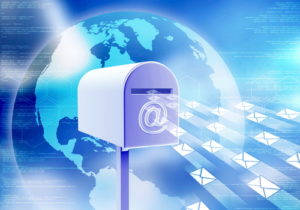Special to the Financial Independence Hub
Raymond Tomlinson, who died a few weeks ago, had a lot of impact on your life. Who was Raymond Tomlinson? He was the computer programmer who invented email.
Way back in 1971 he successfully sent a message from one computer to another. He is also the person who popularized use of the ampersand – @ – for electronic communications. In the early days, of course, email was hailed as a great new way to communicate. Today we’re not so sure.
If you watch your finances – whether you are an investor, advisor or pundit – then taking charge of your emails can help you organize your time and make you more productive. And wealthier. In the same way that keeping to a budget, getting out of debt, and trying to save more money can straighten out your financial life, gaining control of your emails can help straighten out your life.
Over reliance on email
Email is certainly an improvement over putting paper in a package and then dropping it into a mailbox and waiting a few days for it to arrive. Email is instantaneous. But people rely on it more than they should. In fact, companies are now setting up processes designed to reduce, and in some cases, even eliminate their internal company email. The French technology firm Atos, for example, has been able to reduce its internal email by 70% in the past five years.
Microsoft Outlook is the world’s most popular email system. The problem with it is two-fold:
1) the sheer volume of emails can render it ineffective, and
2) email cannot be all things to all people.
I read an article about a woman who had over 37,000 emails in her inbox. Some should have been deleted, others retained for information only and filed in a folder, and others moved into action or follow-up mode. What is commonly referred to as an Inbox is really a To Do Box, a Filing Box, and a Garbage Box. If you never remove emails and never unsubscribe from things of no benefit, this is what happens.
The four Ds for managing email
The key to managing your email life is to make decisions with the 4 Ds: Delete, Delegate, Do it now or file it, and the final one, which is Defer. But the Better Way when deferring is to convert the email into a Task with a Start Date on some future day. And the way I recommend doing that is by subscribing to what I call demonic focus. It involves focusing on priorities, managing all your activities and events, and taking a ‘business planning’ approach to Outlook.
There’s a day called National Clean the Desk Day. Wouldn’t it be nice if that happened every day? By the same token, cleaning up your email system should also be an ongoing procedure. You can start by setting goals like these:
- Start your day with an almost empty inbox.
- Turn your email off and check it on a regular basis. Once an hour works fine for most people.
- Use the Rules features in Outlook to help with routine emails like Newsletters.
- Be proactive in Unsubscribing to unwanted emails.
In my last Hub blog I said to think of Outlook as a ten-ton truck that can carry ten tons of steel, and it can do that. But ten tons of information is unwieldy at the best of times. My workshop on how to make Outlook more efficient and productive teaches these skills:
- The correct and effective use of Tasks and the To Do bar.
- How to convert emails into tasks or appointments, which lets you clean up the Inbox.
- Correct and effective use of the Calendar so you use it ONLY for meetings and appointments.
- How to develop a complete information management tool to plan, record and retrieve notes, conversations and emails – and then sync all this to your mobile device.
- How to configure Outlook so you start your day proactivity, not reactively.
- How to establish rules to streamline your Inbox and deal with urgent vs. non-urgent emails.
- How to organize your time, plan your day, and improve your overall work/life balance.
- A process to manage email.
- How to work from ONLY one task list.
The benefits of organizing Outlook go far beyond cleaning up emails. I’m talking about increased motivation, along with significant reductions in stress, burnout and turnover. The trick is to control your email so it doesn’t control YOU.
 Andy Sherwood owns the Southwest Ontario office of Priority Management, a worldwide training company. He serves the communities of London, Kitchener-Waterloo, Guelph, Cambridge, Windsor, Sarnia and Brantford. Over the past 30 years he has delivered thousands of workshops and trained more than 50,000 people in managing their time. His public and in-house workshops help executives, managers, salespeople and other professionals gain an extra hour of increased productivity every day. He can be reached at priority@andysherwood.ca or 289-878-7398.
Andy Sherwood owns the Southwest Ontario office of Priority Management, a worldwide training company. He serves the communities of London, Kitchener-Waterloo, Guelph, Cambridge, Windsor, Sarnia and Brantford. Over the past 30 years he has delivered thousands of workshops and trained more than 50,000 people in managing their time. His public and in-house workshops help executives, managers, salespeople and other professionals gain an extra hour of increased productivity every day. He can be reached at priority@andysherwood.ca or 289-878-7398.



